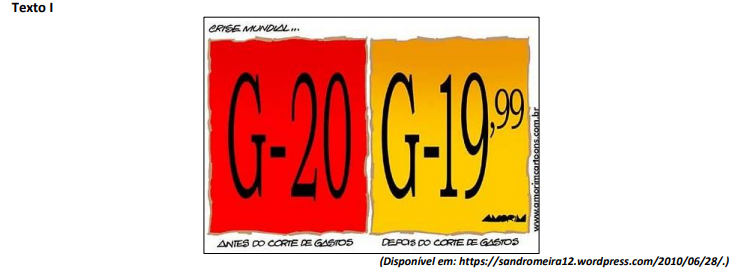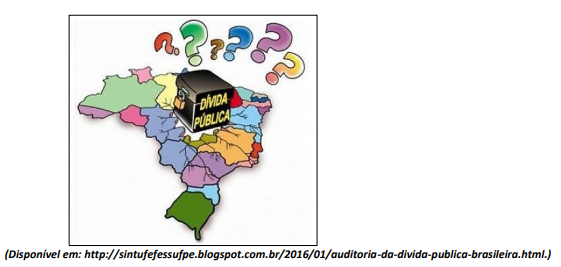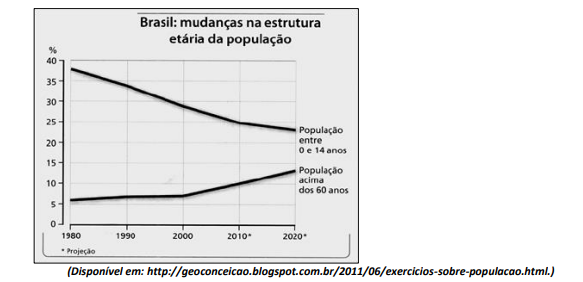Questões de Concurso Público Prefeitura de Leopoldina - MG 2016 para Professor de Educação Básica III - Inglês
Foram encontradas 40 questões
“Chega o meio do outono e começa a operação de guerra. Todo ano, o Ministério da Saúde inicia a campanha de vacinação contra a gripe bastante comum no inverno. Neste ano, as coisas foram um pouco diferentes: os casos da doença começaram a ser notificados antes do esperado. Para piorar, o número de mortes, aumentou. Até o dia 2 de abril haviam sido registrados 102 óbitos no país no ano passado, foram 36. O cenário assustou e causou uma corrida às clínicas e hospitais. O vírus que mais tem gerado essa preocupação é o H1N1, causador da Influenza.”
(Maio de 2016. Novaescola.org.br.)
A doença provocada pelo H1N1, causadora de uma pandemia em 2009, era conhecida na época como gripe
“No ano passado o arquiteto José Ripper Kos participou de uma competição internacional para construir uma casa que consumisse a menor quantidade de energia. Depois do concurso, decidiu instalar em sua casa, um sistema de energia solar. Kos optou por painéis que gerassem energia a partir da luz solar. [...]”
(Revista Época, fevereiro de 2013.)
Os painéis citados no fragmento de texto anterior, que geram energia através da luz do sol são chamados de:
Do mercado financeiro a uma revolução no terceiro setor
Uma das brasileiras mais destacadas na Inglaterra, Daniela Barone fala sobre liderança feminina e Terceiro setor e dá dicas para quem está pensando em mudar de carreira.
Ela disse um sonoro não ao abonadíssimo mercado financeiro de Londres para começar do zero. Daniela Barone Soares, 40 anos, havia decidido que não correria mais atrás do primeiro milhão, do segundo… A virada aconteceu em 2004, exigiu a troca de apartamento e o corte de alguns mimos e fricotes, mas lhe caiu muito bem. Essa mineira de Belo Horizonte – aluna AAA do curso de economia da Unicamp (Universidade Estadual de Campinas) e pós-graduada na meca dos administradores, a escola de negócios de Harvard com bolsa da Fundação Estudar – é um dos nomes mais respeitados do terceiro setor na Inglaterra.
(Disponível em: https://www.napratica.org.br/do-mercado-financeiro-a-uma-revolucao-no-terceiro-setor.)
O terceiro setor corresponde basicamente:

Texto II
“Os países do G-20 se comprometeram com a meta de reduzir seus déficits pela metade até 2013 e por seu endividamento em relação ao PIB em trajetória descendente até 2016. O compromisso faz parte do comunicado de 27 páginas divulgado pelo G-20 ontem, depois de 30 horas de negociação e muita divergência. ‘Economias avançadas se comprometeram com planos fiscais que vão reduzir pelo menos pela metade os déficits até 2013 e estabilizar a relação dívida-PIB até 2016’, diz o comunicado.”
(Disponível em: https://sandromeira12.wordpress.com/2010/06/28/.)
O Grupo dos 20 foi criado em 1999 objetivando o fortalecimento da economia mundial, promovendo o crescimento
econômico e o desenvolvimento sustentável em escala global. Sua criação ocorreu no final da década de 1990, que foi
marcada pela instabilidade econômica e várias crises financeiras. Assinale a alternativa que ausenta apenas países
que ainda fazem parte do G20.

Analisando a imagem e tendo em vista o contexto da organização de um país e seus setores administrativos e econômicos, é correto afirmar que Dívida Pública é:

Em uma época de crise econômica, dúvidas sobre o futuro político do país e insegurança frente ao que está por vir,
uma coisa é certa: o Brasil está envelhecendo – e mais rápido do que se imagina. O envelhecimento populacional
compõe o fenômeno de transição demográfica caracterizado pelo(a)

Em relação ao item destacado na imagem e a outros itens relacionados à Educação, analise os dados a seguir.
I. Tem como principal objetivo avaliar a Educação Básica brasileira e contribuir para a melhoria de sua qualidade e para a universalização do acesso à escola.
II. Programa de crédito educativo destinado a universitários da rede privada.
III. Concede bolsa de estudos integral a estudantes que apresentem renda familiar máxima de um salário e meio.
Os dados das afirmativas I, II e III correspondem a definições ou funções respectivamente:
“A denominação ‘Supremo Tribunal Federal’ foi adotada na Constituição Provisória publicada com o Decreto nº 510, de 22 de junho de 1890, e repetiu-se no Decreto nº 848, de 11 de outubro do mesmo ano, que organizou a Justiça Federal.”
(Disponível em: http://www.stf.jus.br/portal/cms/verTexto.asp?servico=sobreStfConhecaStfHistorico.)
Em relação ao STF, analise as afirmativas a seguir.
I. É o órgão máximo de poder judiciário, guardião dos princípios básicos da Constituição.
II. É o único foro para julgamentos de ações diretas de inconstitucionalidade de leis e atos normativos do Executivo Federal.
III. Cabe a ele a harmonização das decisões tomadas pelos tribunais federais, mas é submisso ao Senado.
IV. Julga as controvérsias ligadas às relações de trabalho, composto por juízes eleitos de 4 em 4 anos.
Estão corretas as afirmativas
Analyse the sentence.

The item that contains an inconsistency and its corresponding correction is:
Analyse the sentence to answer 6.
Douglas had to apologize _________ little Jim’s mom _________ having played those pranks ______ her.
Choose the sequence to complete the blanks.
Refugee judokas searching for peace while fighting for their Olympic dream in Rio

More than two and a half years after they came to Rio de Janeiro to compete in the World Judo Championships, two refugees from the Democratic Republic of the Congo are still here, in pursuit of an extraordinary Olympic dream. When teams from more than 200 countries march into the Maracanã Stadium for the opening ceremony of the Rio 2016 Games on 5 August, Popole Misenga and Yolanda Mabika intend to be among them, walking behind the Olympic flag. The International Olympic Committee (IOC) will mount a unique team of refugee athletes which will compete in Rio. It has been a long journey from central Africa and from a war that has claimed an estimated 5.4 million lives. Mabika, now 28, cannot hold back the tears when she remembers the brothers and sisters she has not seen since 1998, when she was evacuated from her home town to the country’s capital, Kinshasa. It was there, as a child, that she first took up judo. Misenga’s mother was murdered when he was just six years old. The young child wandered for days in the Congolese rainforest before he too was rescued and taken to Kinshasa. Like his compatriot, he soon took to judo, a sport which the Congolese government saw as an ideal way of giving some structure to the lives of the country’s countless orphans. In 2010, Misenga won a bronze medal at the under-20 African Judo Championship. But Misenga and Mabika said training conditions were excessively rigorous, with losing judokas beaten and locked in cells. At the 2013 World Judo Championship, Misenga took the opportunity to begin a better life. After escaping from the team hotel, a couple of days later Misenga found himself in the favela community of Cinco Bocas in northern Rio, home to most of the city’s Congolese community of some 900 people. He sent Mabika a message and she also decided to stay. Life in northern Rio has not always been easy for the judokas. It has been a story of odd jobs and informal employment.The two athletes are now training three times a week at the Instituto Reação. The learning curve has been steep. Geraldo Bernardes, the veteran coach of the Brazilian team in four Olympic Games, says that Misenga and Mabika were initially far too aggressive in training. “They were used to being punished and mistreated when they lost,” Geraldo explains. “I had to tell them that training and fighting are different things.”
Misenga told rio2016.com that he had adjusted to his new surrounds: “I have learnt a lot on the technical side. I can feel in my body that I have learnt what was missing before in my judo.” Their coach says the two judokas are rough diamonds and are still making up for the lost time in their training. Brazil has a strong tradition in the sport and both athletes are hoping that by refining their skills in the country they will make the cut when the IOC decides which athletes (from a shortlist of 43) will form part of Team Refugee in June. In the meantime, both Misenga and Mabika are enjoying their new lives in Rio. The Instituto Reação and the local Estácio de Sá university have given them the opportunity to learn Portuguese, maths and other subjects. Neither of the two judokas has any plan to leave the new home town that has given them so much.
(Available in: http://www.rio2016.com. Adapted.)
Refugee judokas searching for peace while fighting for their Olympic dream in Rio

More than two and a half years after they came to Rio de Janeiro to compete in the World Judo Championships, two refugees from the Democratic Republic of the Congo are still here, in pursuit of an extraordinary Olympic dream. When teams from more than 200 countries march into the Maracanã Stadium for the opening ceremony of the Rio 2016 Games on 5 August, Popole Misenga and Yolanda Mabika intend to be among them, walking behind the Olympic flag. The International Olympic Committee (IOC) will mount a unique team of refugee athletes which will compete in Rio. It has been a long journey from central Africa and from a war that has claimed an estimated 5.4 million lives. Mabika, now 28, cannot hold back the tears when she remembers the brothers and sisters she has not seen since 1998, when she was evacuated from her home town to the country’s capital, Kinshasa. It was there, as a child, that she first took up judo. Misenga’s mother was murdered when he was just six years old. The young child wandered for days in the Congolese rainforest before he too was rescued and taken to Kinshasa. Like his compatriot, he soon took to judo, a sport which the Congolese government saw as an ideal way of giving some structure to the lives of the country’s countless orphans. In 2010, Misenga won a bronze medal at the under-20 African Judo Championship. But Misenga and Mabika said training conditions were excessively rigorous, with losing judokas beaten and locked in cells. At the 2013 World Judo Championship, Misenga took the opportunity to begin a better life. After escaping from the team hotel, a couple of days later Misenga found himself in the favela community of Cinco Bocas in northern Rio, home to most of the city’s Congolese community of some 900 people. He sent Mabika a message and she also decided to stay. Life in northern Rio has not always been easy for the judokas. It has been a story of odd jobs and informal employment.The two athletes are now training three times a week at the Instituto Reação. The learning curve has been steep. Geraldo Bernardes, the veteran coach of the Brazilian team in four Olympic Games, says that Misenga and Mabika were initially far too aggressive in training. “They were used to being punished and mistreated when they lost,” Geraldo explains. “I had to tell them that training and fighting are different things.”
Misenga told rio2016.com that he had adjusted to his new surrounds: “I have learnt a lot on the technical side. I can feel in my body that I have learnt what was missing before in my judo.” Their coach says the two judokas are rough diamonds and are still making up for the lost time in their training. Brazil has a strong tradition in the sport and both athletes are hoping that by refining their skills in the country they will make the cut when the IOC decides which athletes (from a shortlist of 43) will form part of Team Refugee in June. In the meantime, both Misenga and Mabika are enjoying their new lives in Rio. The Instituto Reação and the local Estácio de Sá university have given them the opportunity to learn Portuguese, maths and other subjects. Neither of the two judokas has any plan to leave the new home town that has given them so much.
(Available in: http://www.rio2016.com. Adapted.)
Refugee judokas searching for peace while fighting for their Olympic dream in Rio

More than two and a half years after they came to Rio de Janeiro to compete in the World Judo Championships, two refugees from the Democratic Republic of the Congo are still here, in pursuit of an extraordinary Olympic dream. When teams from more than 200 countries march into the Maracanã Stadium for the opening ceremony of the Rio 2016 Games on 5 August, Popole Misenga and Yolanda Mabika intend to be among them, walking behind the Olympic flag. The International Olympic Committee (IOC) will mount a unique team of refugee athletes which will compete in Rio. It has been a long journey from central Africa and from a war that has claimed an estimated 5.4 million lives. Mabika, now 28, cannot hold back the tears when she remembers the brothers and sisters she has not seen since 1998, when she was evacuated from her home town to the country’s capital, Kinshasa. It was there, as a child, that she first took up judo. Misenga’s mother was murdered when he was just six years old. The young child wandered for days in the Congolese rainforest before he too was rescued and taken to Kinshasa. Like his compatriot, he soon took to judo, a sport which the Congolese government saw as an ideal way of giving some structure to the lives of the country’s countless orphans. In 2010, Misenga won a bronze medal at the under-20 African Judo Championship. But Misenga and Mabika said training conditions were excessively rigorous, with losing judokas beaten and locked in cells. At the 2013 World Judo Championship, Misenga took the opportunity to begin a better life. After escaping from the team hotel, a couple of days later Misenga found himself in the favela community of Cinco Bocas in northern Rio, home to most of the city’s Congolese community of some 900 people. He sent Mabika a message and she also decided to stay. Life in northern Rio has not always been easy for the judokas. It has been a story of odd jobs and informal employment.The two athletes are now training three times a week at the Instituto Reação. The learning curve has been steep. Geraldo Bernardes, the veteran coach of the Brazilian team in four Olympic Games, says that Misenga and Mabika were initially far too aggressive in training. “They were used to being punished and mistreated when they lost,” Geraldo explains. “I had to tell them that training and fighting are different things.”
Misenga told rio2016.com that he had adjusted to his new surrounds: “I have learnt a lot on the technical side. I can feel in my body that I have learnt what was missing before in my judo.” Their coach says the two judokas are rough diamonds and are still making up for the lost time in their training. Brazil has a strong tradition in the sport and both athletes are hoping that by refining their skills in the country they will make the cut when the IOC decides which athletes (from a shortlist of 43) will form part of Team Refugee in June. In the meantime, both Misenga and Mabika are enjoying their new lives in Rio. The Instituto Reação and the local Estácio de Sá university have given them the opportunity to learn Portuguese, maths and other subjects. Neither of the two judokas has any plan to leave the new home town that has given them so much.
(Available in: http://www.rio2016.com. Adapted.)
Refugee judokas searching for peace while fighting for their Olympic dream in Rio

More than two and a half years after they came to Rio de Janeiro to compete in the World Judo Championships, two refugees from the Democratic Republic of the Congo are still here, in pursuit of an extraordinary Olympic dream. When teams from more than 200 countries march into the Maracanã Stadium for the opening ceremony of the Rio 2016 Games on 5 August, Popole Misenga and Yolanda Mabika intend to be among them, walking behind the Olympic flag. The International Olympic Committee (IOC) will mount a unique team of refugee athletes which will compete in Rio. It has been a long journey from central Africa and from a war that has claimed an estimated 5.4 million lives. Mabika, now 28, cannot hold back the tears when she remembers the brothers and sisters she has not seen since 1998, when she was evacuated from her home town to the country’s capital, Kinshasa. It was there, as a child, that she first took up judo. Misenga’s mother was murdered when he was just six years old. The young child wandered for days in the Congolese rainforest before he too was rescued and taken to Kinshasa. Like his compatriot, he soon took to judo, a sport which the Congolese government saw as an ideal way of giving some structure to the lives of the country’s countless orphans. In 2010, Misenga won a bronze medal at the under-20 African Judo Championship. But Misenga and Mabika said training conditions were excessively rigorous, with losing judokas beaten and locked in cells. At the 2013 World Judo Championship, Misenga took the opportunity to begin a better life. After escaping from the team hotel, a couple of days later Misenga found himself in the favela community of Cinco Bocas in northern Rio, home to most of the city’s Congolese community of some 900 people. He sent Mabika a message and she also decided to stay. Life in northern Rio has not always been easy for the judokas. It has been a story of odd jobs and informal employment.The two athletes are now training three times a week at the Instituto Reação. The learning curve has been steep. Geraldo Bernardes, the veteran coach of the Brazilian team in four Olympic Games, says that Misenga and Mabika were initially far too aggressive in training. “They were used to being punished and mistreated when they lost,” Geraldo explains. “I had to tell them that training and fighting are different things.”
Misenga told rio2016.com that he had adjusted to his new surrounds: “I have learnt a lot on the technical side. I can feel in my body that I have learnt what was missing before in my judo.” Their coach says the two judokas are rough diamonds and are still making up for the lost time in their training. Brazil has a strong tradition in the sport and both athletes are hoping that by refining their skills in the country they will make the cut when the IOC decides which athletes (from a shortlist of 43) will form part of Team Refugee in June. In the meantime, both Misenga and Mabika are enjoying their new lives in Rio. The Instituto Reação and the local Estácio de Sá university have given them the opportunity to learn Portuguese, maths and other subjects. Neither of the two judokas has any plan to leave the new home town that has given them so much.
(Available in: http://www.rio2016.com. Adapted.)
Learning strategies are the particular approaches or techniques that learners employ to try to learn an L 2. There have been various attempts to discover which strategies are important for L 2 acquisition.
One example of a mental learning strategy employed in L 2 learning is